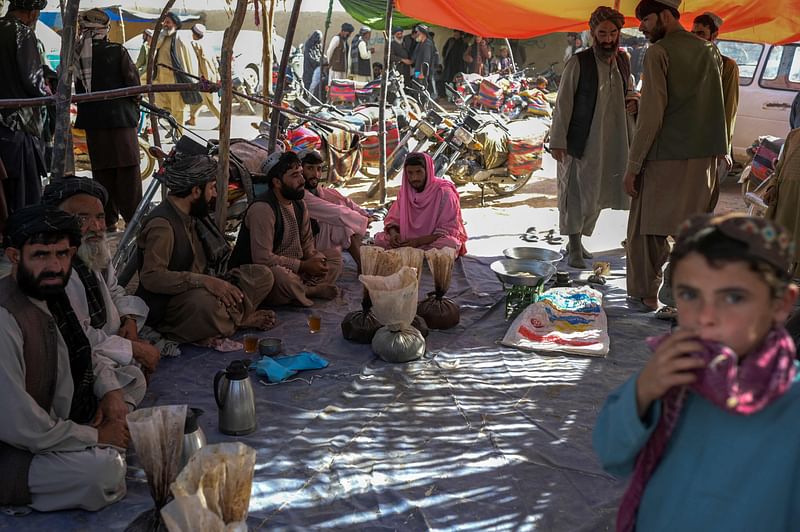
Prices soar at opium market in Taliban-ruled Afghanistan
While the economy teeters on the brink of collapse, vendors at an opium market in southern Afghanistan say prices for their goods have skyrocketed since the Taliban takeover.
Plunging his knife into a large plastic bag filled with four kilograms (nine pounds) of what looks like brown mud, Amanullah, who asked to use a fake name, extracts a lump and places it in a small cup suspended over a primus flame.
The poppy resin quickly begins to boil and liquify, and he and his partner Mohammad Masoom can display to buyers that their opium is pure.
“It is haram (forbidden) in Islam, but we don’t have any other choice,” Masoom says, at the market on the arid plains of Howz-e-Madad, in Kandahar province.
Since the Taliban overran Kabul on 15 August, the price for opium—which is transformed into heroin either in Afghanistan, Pakistan or Iran before flooding the European market—has more than tripled.
Masoom said smugglers are now paying him 17,500 Pakistani rupees ($100, 90 euros) per kilogram. In Europe it has a street value of over $50 a gram.
As he sat beneath a canvas suspended from four stakes to protect the precious wares from the burning sun, he said the price prior to the Taliban takeover stood at just a third of what he can make today.
Speaking to AFP on his field a few kilometres away, poppy farmer Zekria confirms that prices have skyrocketed.
He says his opium is more concentrated—and therefore of better quality—than Masoom and Amanullah’s because the flowers were picked at the start of the harvesting season.
He says he now gets over 25,000 PKR per kilo, up from 7,500 before the Taliban’s takeover.
Contingent on international aid
Back at the market, hundreds of producers, vendors and buyers chat over green tea around sacks of opium and hashish, discussing the soaring prices.
The weather, insecurity, political unrest and border closures can all affect the ever-fluctuating opium price, but everyone seems to agree that it was a single statement by Taliban spokesman Zabihullah Mujahid last month that made the prices take off.
At the time, he told the world the Taliban did not want to see “any narcotics produced”—but added that international backing was needed to allow farmers to shift away from the trade.
The rumour that a ban on poppy-growing was imminent spread through the province, a historical Taliban stronghold and the centre of the country’s opium production and drug trafficking.
Buyers are bracing for a looming shortage, “so the opium price is soaring,” said Zekria, who also used a pseudonym to avoid retribution.
But the 40-year-old, who like his father and grandfather has spent much of his life growing poppies, said he did not believe the Taliban “can eradicate all poppy (farming) in Afghanistan”.
In 2000, during the hardliners’ last stint in power, the Taliban banned poppy growing, declaring it forbidden under Islam, and virtually eradicated the crop.
After the US-led ouster of the Taliban in 2001, poppy farming again proliferated, even as the West poured millions of dollars into pushing alternatives, such as saffron.
‘No other solution’
Then, with the Taliban switching from ruling Afghanistan to insurgency against US-led forces, they relied on opium production to finance their rebellion.
In 2016, half of their revenue came from the trade, according to the United Nations.
Afghanistan’s opium production has since remained high year after year, producing some 6,300 tonnes last year alone, the UN says.
Farmers in the south say it’s impossible to eradicate the trade, which the UN estimates is worth $2 billion in annual revenues in Afghanistan.
“We know it’s not good but we don’t have enough water (or) seeds,” he said.
“We cannot grow anything else right now,” Masoom said, adding that any other trade would be far less lucrative.
Zekria, the sole breadwinner in a family of 25, agreed.
“Without opium, I cannot even cover my expenses,” he said, adding there is “no other solution unless the international community helps us”.
With the UN warning that a third of the country’s population is facing the threat of famine, the Islamists have been tiptoeing around the issue of banning the lucrative practice.
In his office in Kandahar, head of the province’s culture department Maulvi Noor Mohammad Saeed told AFP that “opium production is haram and bad for people”.
But said outlawing production would depend on the aid received.
“If the international community is ready to help the farmers not to grow poppy, then we’ll ban opium.”